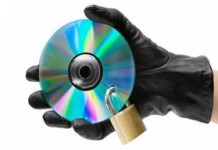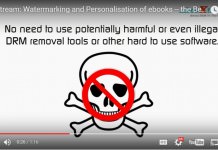 That’s the title of an article in Mainstreet.com that quotes Copyright Clearing Center’s General Counsel Frederic Haber. Haber explains that:
That’s the title of an article in Mainstreet.com that quotes Copyright Clearing Center’s General Counsel Frederic Haber. Haber explains that:
“For the most part there is no real distinction between an e-book and a piece of software. When you buy either, what you are really paying for is a license to use the product, not to own it. The seller is giving you access to this product, but at some point in the future they are entitled to take it back.”
Haber also “speculates that … one day… Instead of paying $9.99 as a flat price for an e-book, publishers may allow for different pricing models where customers pay less to have the book for a couple months, or to buy just a few chapters, and pay more to actually purchase the whole book and keep it forever.”
A lot more detail in the article and well worth reading. The punchline is, of course, the article’s question: But would consumers be so eager to jump onto this new platform if they knew they couldn’t actually own those books?


































This article hits on some great areas and issues concerning eBooks and the rights you have. I agree that the DRM is the culprit, which you would think people would rise up against, but in different markets we see different revolts I guess you could say. In the Ed market, people are more ok with DRM, they still don’t love it, but seem to accept it more. In the consumer market people seem more against it. The interesting part I have seen is that many publishers are interested in DRM free, they’d rather not be tied to a DRM platform and have to worry about who restricts the work.
Having sold eBooks in most markets and now doing some design work with eBooks as well, the interesting thing I have found, many would love to dump DRM, even the pubs and authors. The headache is the aggregators and the eReading devices. We need to shift our focus to more of an agnostic approach, no matter the device, reader (whether on your computer or device) will accept the eBook. Make a standardized form similar to mp3, but better in its use and delivery, no restricting what can be used where.
The other headache that nobody thinks of and doesn’t realize is that you have to track all of these formats, each needs an isbn, if you sell by chapters, more isbns or an identifier of sorts. This all drives up cost along with time spent getting an eBook on a variety of formats, which in itself you have to figure out which ones to go with.
One area I didn’t see discussed though is about eBooks in ePub or drm free titles. In reality if the title you have is on your desktop say and you control what device it goes to, especially with ePub, then it seems as though it would be harder for a company to pull the title, but this means not relying on the cloud, which I feel may be how more companies will plan to control content and control your access. I do agree that we need to fight for perpetual access to titles, you buy it you own it. We have it in academic, granted the eBook is hosted on a platform, but the customer is still entitled to a pdf version of the eBook when they want it. Just some food for thought.
Erik
I think the software analogy is useful. The idea that a supplier may, arbitrarily at some point in the future, take back their license seems wrong, though. Unless the terms of the license specify a fixed time or a right of recovery, the license should be assumed to be indefinite.
I’ve argued in the past that the buy/lease metaphor is limited considering that you don’t actually ‘buy’ paper books, either. You buy the paper and license the content.
DRM is, and should be treated as, a very separate issue. DRM is an attempt to deal with a real problem that (regardless of the extent to which it does or does not deal with this problem) imposes substantial costs on publishers and on consumers.
Rob Preece
Publisher
The analogy with software is OK to use since both are based on code and electrons, however, the idea that software is only licensed and not owned is simply not true. There are many court cases that have thrown out the eula (license) as not enforceable. There is even a court decision regarding first sale rights and software:
“Judge Richard A. Jones rejected that argument, holding that Vernor is entitled to sell used copies of Autodesk’s software regardless of any licensing agreement that might have bound the software’s previous owners. Jones relied on the First Sale Doctrine, which ensures the right to re-sell used copies of copyrighted works.”
“Citing the 1977 case of United States v. Wise, which involved the sale of used films obtained under dubious circumstances, Jones found that the Ninth Circuit’s precedents suggested that the circumstances surrounding the sale of AutoCAD software constituted a sale, not merely a license.”
On a practical note, once I have a book on my computer, whoever claims to “license” it to me is welcome to try and get it back. Simply not going to happen as I always back up my purchased ebooks in a DRM free version. The whole thing reminds me of trying to burn all the books in Fahrenheit 451.
More simply: DRM lowers the value of content, so consumers may be learning to live with it at a lower price. I posted something to this effect last fall: http://bit.ly/1AeRWB
Paul,
The limited-time model is already in place with some publishers through Adobe Editions. At Ohio University Press, we have started making titles available for 30 days, 180 days, and in perpetuity, as well as offering the printed version. The 30-day model costs $5. This is being done through and with our distributor, Chicago Digital Distribution Center. I know that University of Chicago Press is making the same sort of offering, and I imagine many of their other client presses are as well.
Where a time-limited leasing makes more sense is with library loans. I sometimes wonder how much money the Seattle Public Library spends to pull, transport, and process books I request from other branches. If it’s more than a few pennies, it might be better better for all concerned if we could ‘check out’ a book digitally, with a micropayment going to the publisher and author.
Authors might come out ahead if they were paid 10 cents (virtually forever) every time one of their titles is checked out rather than $2.00 once and only for a couple of years while it is sold as a print version.
Something to think about anyway….
This keeps on reminding me more and more of the XKCD comic that states if you really want to own something you have to pirate it. Or to be even more geeky a quote from Princess Leia “The more you tighten your grip, Tarkin, the more star systems will slip through your fingers”.
Since the copyright is intended to be temporary (until it falls into the public domain) the easiest solution is to define the temporary license so that extends one day beyond the temporary copyright.
News Flash for the idiots in ivory towers in the publishing world: I own my books. My paper books I can keep, sell, give away, or deface in any way I want to and have done all that over the years. If there’s some other element necessary to own them, I can’t imagine what it might be. Same for my software. The old copy of WordPerfect I have on this PC has been on at least 2 other PCs I owned in the past and will undoubtedly be on several more in the future. And I own my ebooks. They’re backed up, and while I don’t remove the DRM, I have the software to do it and will if it ever becomes necessary in order to reread a book I bought and want to reread.
I don’t know about anyone else, but my antipathy for everyone in the publishing industry just keeps growing as they keep coming out with more and more b.s. in order to justify screwing readers over ebooks.
Copyright WAS INTENDED to be temporary. But Congress has seen fit to effectively extend it out so far that it might as well be permanent.
I believe that current copyright on written works is now 70 years past the death of the author. So if you are 50 years old, for example, and you buy a book written by a 20 year old who then lives to be 80, you would have to live to the ripe old age of 180 in order to see it fall out of copyright.
In simple terms you will never see the copyright expire on any work created during your life. This is FAR from the intent of the Constitution. But, in our nation today, corporate money triumphs over the Constitution, logic, common sense and just plain decency every single time.